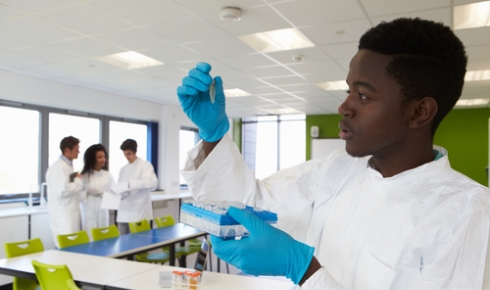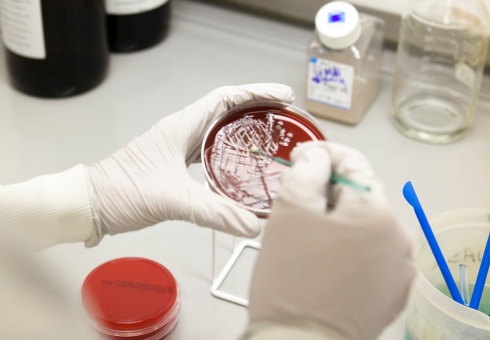How do we get students back to the bench safely?

Universities have done well to adapt to COVID-19 this year using virtual learning – but ultimately, we must ensure students graduating over the next few years are comfortable and competent working in laboratories, writes Professor David Coates
December 4th 2020
With students unable to access laboratories for much of this year, and disputes still ongoing over whether any face-to-face teaching is appropriate, there has been much constructive debate in higher education about online systems and virtual worlds for teaching.
In the life sciences this was exemplified by an article in Times Higher Education (‘Lab teaching could be revolutionised by switch to online’) and several in The Biologist highlighting how educators are adapting to the current situation.
There is little doubt that virtual environments can enhance the learning experience. The debate becomes ‘how much can they replace the physical experience of working in the laboratory?’ This is the key issue as we face an environment forever changed by the COVID 19 pandemic, where the move to online delivery perhaps impacts more – i.e. in subjects where the physical skills of working in a laboratory are as important as the theoretical knowledge and understanding which can be achieved remotely.
The biomedical and life sciences are a professional area that depend critically on laboratory, field and research skills. Without appropriate training in these areas, our biotech and pharmaceutical industries will need to depend on immigration, at a time when everybody around the world not only fears global travel, but needs trained life scientists for their own testing and research programmes.
Employers need graduates who not only have basic training in laboratory and field techniques, but are also practised and comfortable working in those environments. These are environments where things have to be handled, where techniques have to be learned – even apparently simple protocols like accurately diluting stock or spreading bacterial plates take time to practice and perfect. This was the driving force for the development of accreditation by the RSB, with its focus on skills and employer needs, defined by employers and supported by Government.
For several months now, universities have been unsure what to do about teaching in this new academic year – many have severely curtailed or stopped laboratory and field teaching, adhering closely to the social distancing guidelines of whichever nation they are in. There seems to have been a view that this was a short-term crisis, that if we survive the first semester, all will be well. There is no doubt that this first semester of 2020/21 has been enormously difficult, with the need to adapt rapidly to changing rules, and the dangers of the second wave often meaning that any face to face teaching has had to go. There is a danger this fire-fighting approach, used for the first semester of 2020/21, will be carried through to semester two and into 2021/22.
Now is surely the time to be rethinking how we can deliver the experience and practice to students for the remainder of their degree programmes, or we risk (to use what’s becoming a very popular phrase) a ‘lost generation’. With only three or four years of training available, losing two years of laboratory experience and practice will be devastating for these graduates’ employability, as well as for the needs of employers.
Perhaps, where practicals and labs space must be limited, those in their final years should be prioritised; or lab activity which cannot take place in this academic year could be rearranged for subsequent years of a programme rather than abandoned.
 Could some life science students in the UK end up graduating with only limited hands-on experience of laboratory techniques and protocols?
Could some life science students in the UK end up graduating with only limited hands-on experience of laboratory techniques and protocols?There is little doubt that virtual approaches have significant value, but they must, surely, be tied to using the knowledge gained in the physical environment. Much of the original aim of virtual chemistry labs, for instance, was to prepare students for their time in the laboratory, not to replace it.
The biggest limiting factor is space. Teaching laboratory capacity has been severely reduced, so even in those universities where laboratory teaching is continuing, the amount any one student can experience is small – enough to show what a laboratory is, not enough to allow them to be comfortable in what should be their environment.
This will lead to critical issues of national skills supply against demand. Surely this means that extraordinary measures are needed, and the guidance allows for that – social distancing with mitigation.
Of course full health and safety risk assessments need to be done, and everyone involved, students and lecturers, need to be comfortable with their space. But we must be innovative – the question is not whether, but how we can continue to deliver on the enormous improvement in skills and employability that the biomedical and life sciences have seen over the last five years, to the benefit of all concerned.
We should be leading, working with employers who have found ways to continue their critical research and production in the age of COVID-19.
For more from The Biologist on practical teaching during the pandemic see here.
Professor David Coates MBE CBiol FRSB is Professor of Life Sciences and Chancellor's Award Fellow at the University of Dundee, and chairs the RSB’s Accreditation Committee


